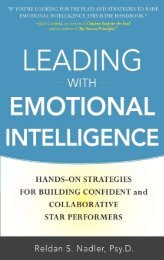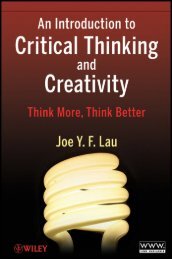A Selective Study in Post-Colonial Bengali Cinema - always yours
A Selective Study in Post-Colonial Bengali Cinema - always yours
A Selective Study in Post-Colonial Bengali Cinema - always yours
Create successful ePaper yourself
Turn your PDF publications into a flip-book with our unique Google optimized e-Paper software.
15|Journal of <strong>Bengali</strong> Studies, Vol. 1, No. 2<br />
a revolutionary future (which might proverbially belong to socialism). Possibilities of a postcommunist<br />
aesthetics and politics emerge from Herbert's death. The aesthetic (not <strong>in</strong> the sense of<br />
artistic qualities, but <strong>in</strong> the orig<strong>in</strong>al sense of discourses perta<strong>in</strong><strong>in</strong>g to bodily sensations; it is from<br />
this orig<strong>in</strong>al sense medical sciences have the antonym anaesthesia) versus logic conflict <strong>in</strong> Herbert<br />
is particularly <strong>in</strong>terest<strong>in</strong>g. The compulsions of the physical body we are born with are not malleable<br />
to cold reason, which <strong>always</strong> represents the case of power. Ghosts are no longer commensurate with<br />
a world dom<strong>in</strong>ated by the immediate urges of the present that is ruled by a vulgar materialism<br />
(represented by the rationalists). But paradoxically, ghosts are a material need: our body needs the<br />
memory of phylogeny. Human bodies are existentially conditioned to myths. Herbert <strong>in</strong>vents stories<br />
of souls because that is a bodily desire to reach out to the dead, while this aesthetic long<strong>in</strong>g of<br />
Herbert enters <strong>in</strong>to deep conflict with the logic of a mechanical materialism that is championed by<br />
the rationalists. Terry Eagleton, who <strong>in</strong> recent years entered <strong>in</strong>to heated debates with rationalists like<br />
Richard Dawk<strong>in</strong>s and Christopher Hitchens (Eagleton took the side of theology, God and the<br />
human need for religion: those who are <strong>in</strong>terested <strong>in</strong> further read<strong>in</strong>g can study Eagleton's Reason,<br />
Faith and Revolution: Reflections on the God Debate) observed:<br />
I th<strong>in</strong>k McCabe was right to see that the traditional Christian belief is <strong>in</strong> the resurrection of<br />
the body rather than the deeply non-Judaic notion of the immortality of the soul. As Thomas<br />
Aqu<strong>in</strong>as might have said, if a renewed form of existence doesn't <strong>in</strong>volve my body it doesn't<br />
<strong>in</strong>volve me. He identified people with their bodies – as Wittgenste<strong>in</strong> did <strong>in</strong> that remark that<br />
if you want an image of the soul you should look at the human body. Soul-language is just<br />
a way of account<strong>in</strong>g for what makes creative, historical, self-transformative bodies like<br />
human ones ontologically dist<strong>in</strong>ct from material bodies like CD players and peperclips.<br />
Once one has a sufficiently phenomenological account of the body, such language can drop<br />
out of the picture. It's no longer useful <strong>in</strong> one's battle with the mechanical materialists.<br />
(Eagleton and Beaumont 310) (bold letters m<strong>in</strong>e)

















